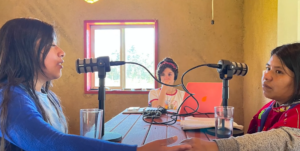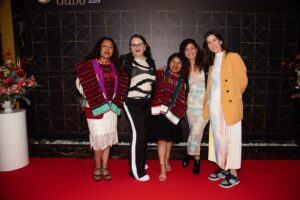Nayelli López Reyes is a 27-year-old weaver, workshop facilitator, and Indigenous rights activist from the small town of San Martín Itunyoso in the Mexican state of Oaxaca. And for years, she longed to speak out against the violence women in her community experience.
That’s why when she learned in 2021 that Spotify Mexico was taking applications from women wanting to tell their stories, she decided to give it a shot.
“I sent my application at the last minute, on the last day,” López Reyes told LatAm Journalism Review (LJR). “I didn't think I’d get it, but a month and a half later, they picked me.”
The result was Guii Chanaa/Mujeres Valientes, a six-part podcast narrated in Spanish and the language spoken in López Reyes’ community, Triqui. López Reyes and other women from San Martín Itunyoso explain how they’ve experienced violence and criticize the still-existing custom of selling women for marriage.
The podcast won the Gabo Award for audio at this year’s Gabo journalism festival in Bogotá. The jury’s statement said it stood out for its authentic and raw portrayal of sexual violence against women in its Indigenous community, and for its impeccable and minimalist production.
As she explains in the podcast, López Reyes named it Guii Chanaa because it means women who weave and refers to one of the first skills girls learn in their Indigenous community.
First, they learn to weave napkins and eventually move onto weaving the traditional huipil dress. Many women in San Martín Itunyoso who have left abusive marriages have been able to earn a living and raise their children by weaving.

In Guii Chanaa/Mujeres Valientes, women from a tiny town in Oaxaca tell their stories of survival and speak out against forcing girls into marriage. (Photo: Oronda Studio)
Breaking the silence represents many challenges, and the women who shared their stories were brave, López Reyes said.
“We’re like the loom,” she said. “We weaved our lives and stories like the fabric we hold in our hands.”
The podcast features stories from people of different ages: girls who at 13 are forced into marriage, women who have had to return to their community and ask for forgiveness despite having been abused and abandoned by their husbands, and grandmothers struggling to understand that a new generation wants to live differently.
“I know it's an emotional and sad podcast, but it also gives you hope,” López Reyes said. “It makes you reflect and question violent traditions.”
Behind the Microphone
After being selected for Spotify’s podcast program, López Reyes got support from Spotify and the Mexican production company Oronda Studio. For six months, she learned script writing, editing and production. Then she worked with Oronda Studio for three months to create a pre-production road map, said Manuela Walfenzao, co-founder of Oronda Studio and one of the producers on the podcast.
Interviews were recorded in the community of San Martín Itunyoso, in the interviewees' homes, and in a local shelter that provided its spaces for some recordings.
Getting the interviews was not difficult, but working in Spanish and in Triqui was, Walfenzao said. First, they found a man who had worked as a translator between the two languages. But they hesitated because he was a man, and the stories were of violence perpetrated by men against women in a very small town.
Instead, the team chose to work with Nayeli’s sister Gabriela Reyes, who is fluent in both languages and has studied Indigenous rights. The interviewees could choose whether to tell their story in Spanish or Triqui, and Gabriela would translate the interviews at Oronda’s studios in Mexico City.
Gabriela would read the transcript of an interview in Spanish and translate it out loud into Triqui because the language is oral and not written, Walfenzao explained. From Triqui, she would translate into written Spanish first, and then read it out loud.
Then, the audio post-producer would connect the translations one sentence at a time, Walfenzao explained.
“It was tough,” she told LJR. “The system was a little wild.”
Community Reaction
San Martín Itunyoso is in a corner of western Oaxaca with poor phone and internet service. So the producers of the podcast held listening sessions in the community, inviting family members and friends of the interviewees.

The podcast won the Gabo Award for audio at this year’s Gabo journalism festival in Bogotá. (Photo: Secretary Office of Culture of Bogota).
“Most people in the community didn’t know what Spotify was," López Reyes said.
Reactions were generally positive, she said. But she also received intimidating messages directed at her and her family on Facebook, especially after the Mexican magazine Quién put her on a list of “31 Women We Love,” she said.
“They said I had exposed the community, that what I said in the podcast was a lie,” she said. “There was some backlash in that regard, but most were fake or anonymous accounts.”
After the podcast came out, other Mexican Indigenous women have wanted to share their stories to make a change in their communities. López Reyes said she wants to make a second season of Guii Chanaa/Mujeres Valientes and continue advocating for her community’s rights
“I will continue working with women and telling their stories,” López Reyes said. “I'm not a journalist, but this podcast has turned me into a researcher, and I’m just getting started.”